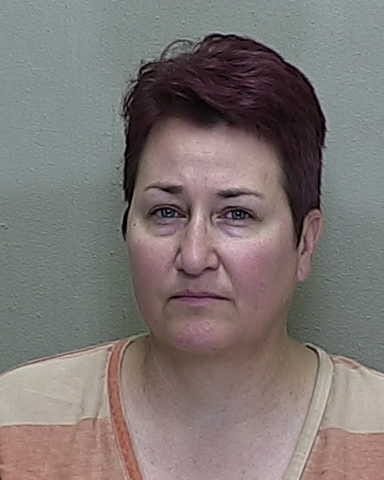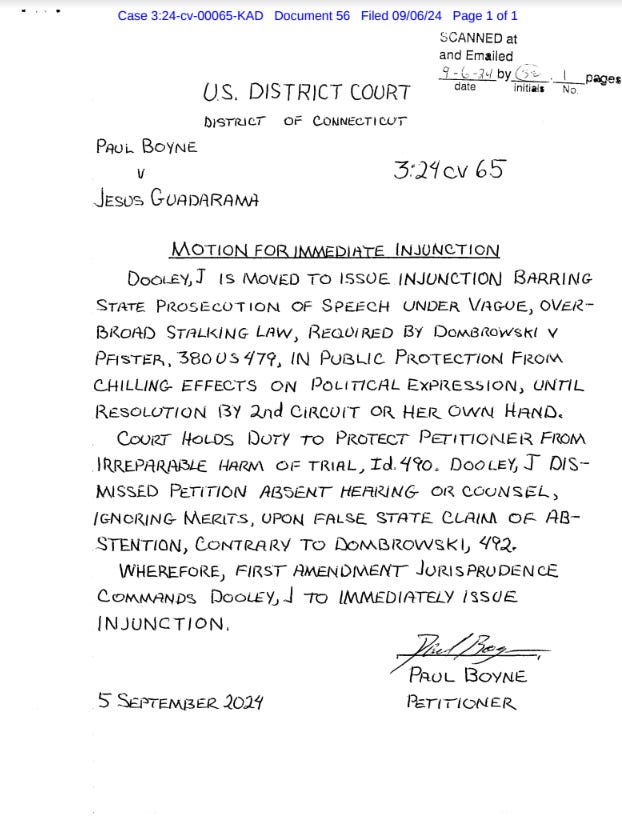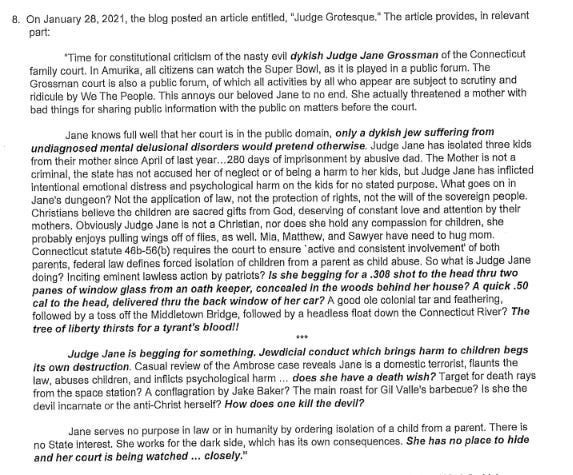By Richard Luthmann
In a recent update on "The Unknown Podcast" with journalists Michael Volpe and Richard Luthmann, Paul Boyne’s legal troubles have taken a dramatic turn. Boyne, sitting in a Connecticut jail awaiting trial for blog posts targeting judges, claims his court-appointed lawyers from Kirschbaum Law Group, LLC, are deliberately prolonging his detention by falsely asserting that he is incompetent to stand trial.
Paul Boyne: My Appointed CT Lawyers Sabotaged My Freedom
“And it turns out, I did find out that Judge [Gerald L.] Harmon, the pre-trial judge, had agreed 'he had served enough time,'…
This move has delayed his trial indefinitely, and Boyne now believes it is part of a tactic to pressure him into a plea deal.
Boyne, who faces 18 counts of stalking and electronic stalking for his posts on the Family Court Circus blog, was extradited from Virginia to Connecticut. The charges stem from his writings criticizing Connecticut judges, some using inflammatory language. His case has raised serious questions about the limits of free speech, with Boyne maintaining that his blog posts are protected under the First Amendment.
According to Boyne, his court-appointed attorneys, Jennifer Buyske and Alice Powers, blindsided him by raising the issue of his competency right before a plea deal was set to be finalized. Boyne says the agreement would have allowed him to walk out of court with a time-served sentence, but his lawyers intervened, claiming he was not mentally fit to proceed.
"They claimed I was incompetent just to stop the plea deal," Boyne said in a conversation with Luthmann. "I was ready to plead to anything, even being the second gunman on the grassy knoll, just to get out of jail."
The competency claim stemmed from an incident in August when Boyne suffered a concussion after an altercation with another inmate. His lawyers cited the injury as a reason to question his understanding of the proceedings, but Boyne insists he fully grasps what is happening.
"This is a tactic to delay the trial and keep me locked up," Boyne said. "I know exactly what’s going on. I understand the charges and was prepared to take the plea deal."
The podcast hosts delved deeper into the strategy behind the competency claim, suggesting that the lawyers are using it as a pretext to avoid going to trial. "This stops the speedy trial clock," Luthmann explained. "Now Boyne will be sent for a competency evaluation, which could take months. It’s a way to keep him in jail without moving the case forward."
Michael Volpe, who closely follows Boyne’s case, expressed disbelief.
"He wrote a federal motion by hand because he doesn’t have access to a computer. Why didn’t his lawyers write it for him? They are supposed to be representing him, yet they’re the ones keeping him in jail."
The timing of the competency claim raises further questions, as Boyne was on the verge of securing his release through a plea deal.
"Judge Gerald Harmon was ready to sentence me to time served," Boyne said. "I would have walked out of court on Monday, but my lawyers stopped it. They’re working against me."
Volpe also discussed Melissa Diegel’s case in 2019. He wrote:
The most notorious case of medical kidnapping in Arizona was Melissa Diegel.
The State of Arizona wasn’t satisfied taking Melissa’s children; they wanted to twist the knife. Many years after the alleged incidents described, they charged her with crimes.
Not only were Diegel’s children removed for purportedly unnecessary medical treatment for these conditions, but now she is being
Like with Paul, Diegel’s case dragged on with no end, when, just as in Paul’s case, her court appointed attorneys, in 2021, suggested she was incompetent to stand trial. Check out the hearing below from the Summer of 2021.
One significant difference is that Melissa made bail. She was able to fight the legal case while remaining free. In 2022, Arizona and Diegel finally worked out a plea agreement where she was given a slap on the wrist for a minor crime. Her daughter gave an impassioned speech at her sentencing, blaming everyone but her mother for what was done to her.
Volpe and Luthmann also discussed the broader implications of Boyne’s case, particularly in light of his pending federal motion based on the Dombrowski v. Pfister decision. Boyne argues that Connecticut’s prosecution of him is unconstitutional and that federal courts should intervene to prevent a chilling effect on political expression.
However, his lawyers refused to assist him with the federal filing, leaving Boyne to represent himself in that matter.
"The federal case is his best shot at getting out of jail," Luthmann said. "The state system is dragging this out as long as they can."
Boyne’s case has drawn attention to its implications for free speech, especially in the digital age. His blog posts, while harsh and inflammatory, may still fall under the protection of the First Amendment. Yet, the state of Connecticut has pursued criminal charges, arguing that his writings incite violence against judges.
One such post referred to a judge as “begging for destruction” due to their conduct. While Boyne acknowledges the provocative nature of his language, he insists that his speech is constitutionally protected and that the state is simply trying to silence him for criticizing the family court system.
"The state is using these charges as a way to punish me for speaking out," Boyne said. "They don’t have a case, so now they’re trying to keep me locked up through any means possible."
Volpe expressed concern that Boyne’s situation will continue to deteriorate if his competency evaluation is dragged out. "They’ll keep him in jail until they offer a plea deal that amounts to time served, and by then, Boyne will take it just to get out," Volpe said.
Boyne’s frustration with his legal representation is evident. He maintains that his lawyers are failing to defend him and are actively working against his interests.
"They’re not representing me; they’re sabotaging me," Boyne said. "I should have walked out of court, but instead, I’m still sitting in jail because of their incompetence claim."
The case is now in a holding pattern as Boyne waits for a competency evaluation, which could take months. Meanwhile, his fight in federal court continues, though he is left to navigate that process largely on his own.
As Boyne’s legal battle drags on, the central question remains: is this a case of stalking, or is it an attempt to criminalize free speech? The answer may determine not only Boyne’s fate but also the broader boundaries of First Amendment protections in an era of online expression.

























Share this post